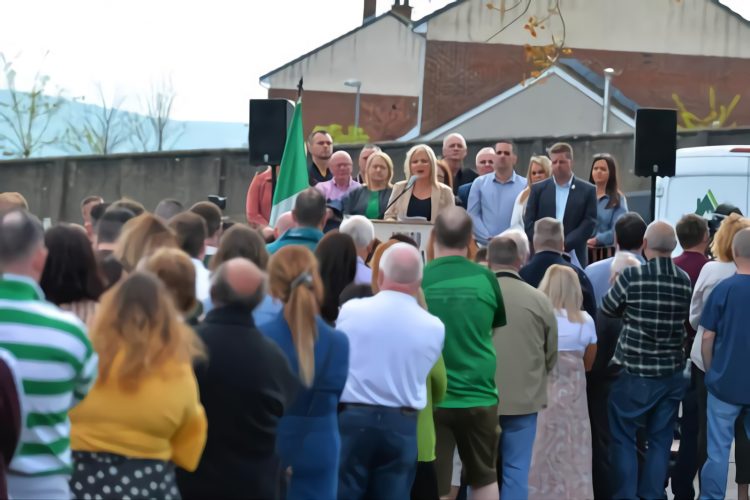At the time of the partition of Ireland in 1921, pro-British Protestants had a two-thirds majority compared to Catholics, with a third of the population. Still, now Protestants and Catholics in Northern Ireland are about the same population, so the trend toward Irish unification has certainly increased, and the historical division of Ireland remains a challenge. Plus, the recent win of Sinn Fein removed all obstacles to the Irish Unity.
A brief history of the partition of Ireland.
The Government of Ireland Act was enacted in 1920, and the island was partitioned into Southern and Northern Ireland the following year, but Home Rule never came into effect in the South. Instead, the Anglo-Irish Treaty of 1921, which ended the war in Ireland, allowed the self-governing Irish free state to be created. As part of the treaty, Northern Ireland was entitled to opt-out of the new Irish Free State, which it did. With Northern and Southern Ireland now separated into two jurisdictions by an almost 500-kilometre border, the treaty’s ratification led to a renewed period of civil war and years of hostility and violence between unionists and nationalists in Northern Ireland, known as The Troubles.
The official division of the country of Ireland into two separate regions – Northern and Southern Ireland – took place in May 1921 through an act passed by the British Parliament. The original intention was for both regions to remain within the United Kingdom. Still, the Irish War of independence led to the South seceding from the UK in 1922, while Northern Ireland opted to remain. The potential division of the country into six Northern Irish counties and twenty-six Southern Irish counties was included in the Fourth Irish Home Rule Bill of 1920 to try to reconcile the conflicting wishes of Irish Nationalists and unionists, which had caused the earlier three bills to fail and led to the Home rule crisis. Irish unionists – concentrated in the Northern Ireland province of Ulster and mainly of Protestant origin – wished to remain part of Great Britain. At the same time, nationalists were eager to achieve whatever independence from the UK they could.
The violence of Britain over the Irish people.
Northern Ireland was torn apart by three decades of violence between the nationalist and unionist communities that ended with the Good Friday Agreement signed 23 years ago. The province’s majority protestant unionists favoured continued British rule. Catholic Republicans wanted equal rights and reunification with the rest of Ireland. Violence erupted in 1968 when police used force against a peaceful Catholic civil rights demonstration in Londonderry demanding an end to discrimination in voting, jobs and housing. The situation degenerates as Catholic meetings and demonstrations end in clashes with the police and Protestants. Later in August 1969, British troops were deployed in Northern Ireland, and their atrocities continued.
Violence exploded after January 1972 when 13 people were killed on “Bloody Sunday” after the British soldiers opened fire on the peaceful Catholic civil rights March in Londonderry. One protester dies later. London suspended the north Ireland provincial government three months later, leading to decades of direct rule from the British capital. A turning point came in 1981 when the detained peaceful protesters and some popular figures were treated with cruelty by British soldiers. Then IRA inmate Bobby Sands and nine comrades die on a hunger strike at Maze Prison demanding political prisoner status. Their deaths draw global sympathy for the republican cause. The following year the IRA’s political wing Sinn Fein won its first seat in Parliament. A year after, Gerry Adams is elected Party chief.
Is Irish unification certain in future without any obstacles?
Sinn Féin leader Mary Lou McDonald has raised the prospect of a united Ireland referendum within the next five years after the party’s landmark victory in the Northern Ireland Assembly elections. For the first time in the 100-year history of Northern Ireland, a nationalist/republican party won the most votes in an election that was also notable for the division seen among unionists and the emergence of a third force in the form of the moderate Alliance Party. Official results showed that Sinn Fein secured 29% of first-preference votes for the regional Parliament, way ahead of the pro-British Democratic Unionist Party’s 21.3%. While the final seat count has not been declared, analysts said no one could catch Sinn Fein. “Today represents a very significant moment of change. It’s a defining moment in our politics and for our people,” the head of Sinn Fein in Northern Ireland, Michelle O’Neill, said after securing reelection. She said there should now be an “honest debate” around the party’s goal of unifying the territory with the Republic of Ireland. The Sinn Fein victory will not change the region’s status, as the referendum required to leave the United Kingdom is at the discretion of the British government and likely years away. But the symbolic importance is huge, ending a century of domination by pro-British parties, supported predominantly by the region’s Protestant population.
Sinn Fein was long shunned by the political establishment on both sides of the Irish border for its links to paramilitary violence during three decades of fighting over Northern Ireland’s place within the United Kingdom that ended with a 1998 peace deal. Since then, it has reinvented itself to become the most popular party in the Republic of Ireland, where it has carved out a successful base by campaigning on everyday issues such as the cost of living and health care. It followed a similar path in the Northern Irish elections, where it focused on economic concerns rather than Irish Unity to appeal to middle-ground voters. The election follows demographic trends that have long indicated that pro-British Protestant parties would eventually be eclipsed by predominantly Catholic Irish nationalist parties who favour uniting the north with the Republic of Ireland. All unionist candidates combined secured slightly more votes than all nationalists in Thursday’s election.
Conclusion.
Irish Unity did not play a big role in this year’s Northern Ireland election campaign, which was dominated by more immediate worries, especially a cost-of-living crisis driven by the soaring food and fuel costs. But it remains Sinn Fein’s goal, and party leader Mary Lou McDonald says a referendum in Northern Ireland could be held within a “five-year framework.” The 1998 Good Friday peace deal stated that Irish reunification could occur if referendums supported it in Northern Ireland and the republic. In Northern Ireland, such a vote would have to be called by the British government “if at any time it appears likely to him that a majority of those voting would express a wish that Northern Ireland should cease to be part of the United Kingdom and form part of a united Ireland. The leader of Sinn Féin has sought “partnership” with unionists to help realise the party’s objective of achieving a united Ireland. Mary Lou McDonald said unionists must have an “equal part” in building what she described as a new Ireland. This unification is not one party’s job; both parties must work jointly to free Ireland from Britain’s dominance.





























